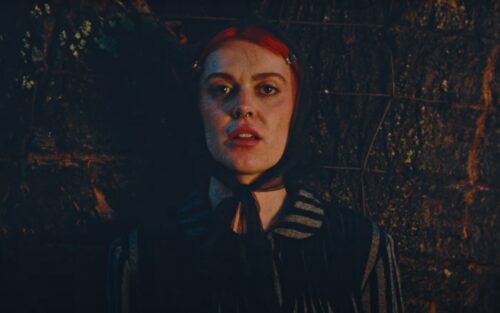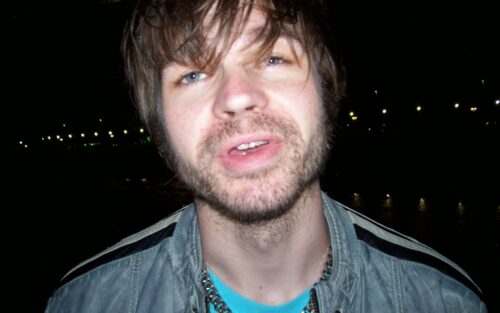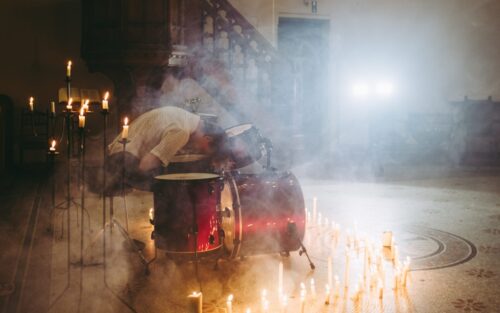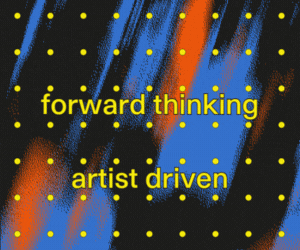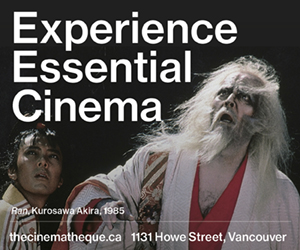The Push And Pull of METZ
The Toronto punk trio find themselves more grounded than ever before with new album, Up On Gravity Hill.
By Gregory Adams
Photo by Vanessa Heins
- Published on
Back on their 2012 self-titled debut, songs like “Sad Pricks” and “The Mule” had METZ’s frontman dialling into feelings of extreme isolation and paranoia. Sure, anxiety also creeps into newer numbers like “Wound Tight” — where Edkins sings of an agitated state that’s about to make his “head pop” — but Up On Gravity Hill also seems to suggest we can make it through our struggles if we open ourselves up to others and express, as “Never Still Again” phrases it, “love without fear.”
Parallel to the blossoming rose of Gravity Hill’s cover art — a print from Canadian artist Sara Cwynar — the explanation for Edkins’ change of heart comes down to a dozen years of personal growth.
“When you listen to those songs, it’s a person who’s super frustrated and kind of scared,” Edkins explains of METZ’s earliest rage-outs. “A lot has happened in my life since that first record that has made me a better person. I’m more in touch with who I am, and with my emotions. As opposed to lashing out in song form, I’m being more introspective about life, and the people that I love.”
Sure enough, since forming in 2007, Edkins, bassist Chris Slorach, and drummer Hayden Menzies have gone through a lot together. Their music, a pressure-cooker of pummelled rhythms and paint-sanding noise-pop riffs, has brought them to global stages many times over — at certain points clocking hundreds of shows a year. Back at home, they’ve also become parents. With all that in mind, Edkins could either be weighing in on familial or band-based bonds on the new album’s “Superior Mirage,” where a melodic, tone-warped chorus has him unleashing a heartfelt “we come undone without each other.” When pressed on this, Edkins confesses that even if the latest METZ album pushed him “to open up in a more revealing way,” he’s still leaving the finer points of his lyricism to our imaginations.
“It could be about any relationship,” he says diplomatically, choosing not to anchor the meaning of his lyrics to a specific situation. “I like to think of it as this bigger, societal thing [of] how we need to take care of each other. Only together can we make things better, things like that. But at face value, there are quite a few songs on this record that you could say are love songs. I don’t think I would argue that.”


What’s surer is that the trio went back down to Pawtucket, Rhode Island’s recording studio and performance space Machines With Magnets to record Up On Gravity Hill with producer Seth Manchester, who’d previously tracked the band’s Atlas Vending from 2020. Between albums, the members of METZ experimented with other projects. Edkins explored chord-jangling outsider pop as Weird Nightmare; Slorach added guitars and vocals to enigmatic post-hardcore collective The Armed’s most recent releases; Menzies worked as a painter/illustrator. Despite the excitement of reconnecting for new METZ material, Edkins also describes the mood of the Gravity Hill sessions as having been “heavy as hell,” with the members simultaneously working through various family events, and “losing people.”
At times, recording the project was creatively challenging for the outfit, though METZ were more generally up for shaking things up sonically. Speaking with the Cult and Culture podcast last fall, Slorach noted some initial unease at rolling off his usual layers of bass fuzz, while Edkins says Menzies wasn’t entirely convinced about Manchester’s decision to fully distort, process, and pitch shift the drum sound for album finale “Light Your Way Home,” this abrasive aesthetic paradoxically placed beneath the open-chorded, magenta romanticism of METZ’s first-ever ballad. Despite the reservations, the strong communication lines between Manchester and METZ ultimately led the foursome towards trusting the process fully.
“From what I can tell, the key to any kind of long-term relationship is giving people space, giving people the ability to work through things they need to work through, and also hearing them out,” Edkins suggests. “This isn’t specifically about the band in any way, but in general [the] things left unsaid are [what] end up boiling over, festering, and turning into something bigger than it should have been.”

Photo: Vanessa Heins
METZ have always sounded huge, but the group further built out their sound by bringing guest musicians to their Gravity Hill. Orchestral auteur Owen Pallett appears on the epic, introductory “No Reservation / Love Comes Crashing,” where spectral classical strings shimmer around Menzies’ frenzied, near blast-beating crescendo. On the other side of the spectrum, Black Mountain’s Amber Webber adds down-soft vocal melodies to the aforementioned “Light Your Way Home.”
Edkins ballooned his own vocal presence while multi-layering harmonies onto “99.” Though informed by his love of ‘60s pop-vocal groups like the Free Design, the naturally noisy world of METZ pushed Edkins’ experiment to harmonic extremes. “It went from sounding good and pretty to sounding almost insane, like a drunken girl group or something. It had passed the point of being a normal harmony. That’s what drew us to it.”
In many ways, Up On Gravity Hill is not your normal METZ record. While it certainly speaks to the imposing pounding of their earlier works, the power trio have learned that leaning off the distortion — at least relative to themselves — can sometimes make for more dynamic songwriting choices. “We’ve done fuzz bass; we’ve done screaming feedback. We love all that, but let’s see what else we can do,” Edkins says to sum up the bolder sonic experimentation within METZ’s most emotionally vulnerable, but nevertheless powerful new album.
“At its core, METZ is a crushing punk band. You can hear that on this record, you just don’t hear it the entire time. We wanted [the album] to be this bigger experience than just [being] the crazy live band. I don’t know if I would call it softer, gentler, or more mature. It’s just where we are now.”
By Stephan Boissonneault
Nate Amos revisits a decade of stray ideas and turns them into his most compelling record yet.
By Khagan Aslanov
Mike Wallace’s electro-punk project premieres the hypnotic, percussion-driven video for "Certain Days."

